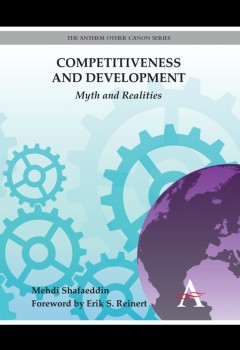Competitiveness and Development
Myth and Realities
By Mehdi Shafaeddin
Foreword by Erik S. Reinert
- About This Book
- Reviews
- Author Information
- Series
- Table of Contents
- Links
- Podcasts
About This Book
Almost all industrial countries have undergone strategies to maintain, or improve, competitiveness in order to improve the standard of living of their population, particularly during the last quarter-century or so. But how have they treated developing countries? ‘Competitiveness and Development’ explains how developing countries can attain competitiveness at a high level of development, examines the possibilities and constraints in achieving it, and proposes remedial measures at the national and international levels.
The author Mehdi Shafaeddin illustrates how developed countries impose restrictive policies on developing countries through international financial institutions and the WTO, as well as regional and bilateral agreements, thereby limiting their policy space for promoting dynamic comparative advantage in order to achieve competitiveness at a high level of development. Such policies, the author argues, lock developing countries that are at the early stages of development in specialization in primary commodities, or at best simple processing and assembly operations in accordance with their static comparative advantage.
To support this argument, the author critically examines the neoclassical theory of economics, which is the philosophy behind the principle of static comparative advantage as well as the policy stances of international financial institutions and the WTO. The author also reviews the historical experience of developed countries through industrialization, development and achieving competitiveness based on the principle of dynamic comparative advantage. In this context, he explains the importance of trade and industrial policies and the role of government in human resource development, innovation and technological development. To illustrate his case, the author compares the contrasting experiences of China and Mexico since the 1980s, during which time globalization has been intensified.
Reviews
'‘Competitiveness and Development’ is an original, innovative and heterodox synthesis of the microeconomic foundations of firm behaviour so crucial to realizing their development potential. Shafaeddin brings together classical as well as contemporary insights on state–firm, interfirm and intrafirm relations, besides case studies from China and Mexico, to better understand enterprise strategy, capacity, capabilities, competitiveness and potential.’ —Jomo Kwame Sundaram, FAO Assistant Director General for Social and Economic Development and G24 Research Coordinator
‘Mehdi Shafaeddin’s book focuses on the need for states to create institutions to drive long-term structural change and economic growth. The world needs short-term stimuli, but Shafaeddin lucidly provides the building blocks for what it takes to recover in a manner that will breed long-term prosperity in developing countries.’ —Professor Kevin Gallagher, Global Development Policy Program, Boston University
‘This book proposes a novel and rich view of competitiveness, and argues that its improvement requires proactive and purposeful government policies if higher levels of development and living standards are also to be achieved. Shafaeddin’s book exposes the limitations and shortcomings of mainstream economic theory and neoliberal policies, and is highly recommended.’ —Dr Alberto Paloni, University of Glasgow
Author Information
Mehdi Shafaeddin is a development economist with a DPhil degree from Oxford University and over 30 years of experience in teaching, research and policy advice at the national and international levels. He held the position of Head, Macroeconomic and Development Policies Branch, UNCTAD. He is currently an international consultant. Shafaeddin is the author of many articles on trade, industrialization and development policy issues in international academic journals. His latest books include ‘Trade Policy at the Crossroads: The Recent Experience of Developing Countries’ (Palgrave Macmillan, 2005).
Erik S. Reinert is Professor of Technology and Development Strategies at the Tallinn Technical University in Estonia, and is the President of the Other Canon Foundation.
Series
Anthem Other Canon Economics
Table of Contents
List of Tables, Figures and Boxes; Foreword; Preface; Acknowledgements; List of Abbreviations; 1. Introduction: Framework of Analysis; 2. Context and Conditions of International Competition; 3. Alternative Theories of Competitiveness; 4. Firm Strategy and New Industrial Organization; 5. External Economies: Organization of Interfirm Relations; 6. Reputation and Trust: A Firm’s Relations with Stakeholders and Others; 7. Innovation and Upgrading; 8. Government Policies; 9. The Experiences of China and Mexico; 10. Summary and Concluding Remarks; Appendices; Bibliography; Index
Links
Stay Updated
Information
Latest Tweets



